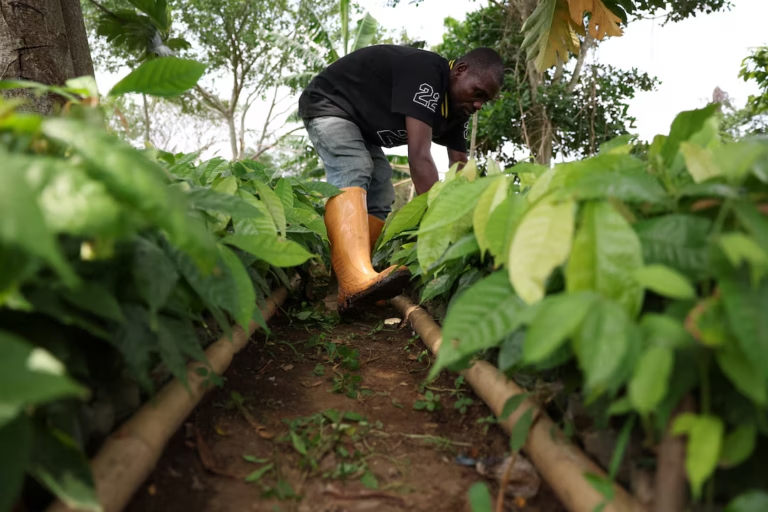In recent years, an increasing number of Nigerians have turned to cocoa farming, driven by a surge in cocoa prices and the promise of lucrative returns. Thousands are leaving their traditional careers to join the thriving cocoa sector, drawn by the fortunes made by farmers in cocoa-producing regions like Ikom, in Cross River State.
One such individual is Anyoghe Akwa, a 47-year-old civil engineer from Ikom. Once hopeful for a career in construction, Akwa shifted his focus to cocoa farming after hearing about the soaring prices in 2023. “We saw young people in their twenties, with no formal education, earning more than we did,” Akwa shared, reflecting on his decision to abandon his academic aspirations. “So, we returned home to open our own farms.”
Akwa’s story is not unique. He is part of a growing group of new cocoa farmers, often referred to as “cocoa boys,” who have embraced farming or related jobs to capitalize on the booming cocoa prices. The Cocoa Farmers Association of Nigeria reported an increase of over 10,000 new members between 2023 and 2024, as many followed suit and turned to cocoa as a profitable venture.
In Ikom, most farmland is community-owned, and newcomers can gain access to plots through a relatively simple process involving a small offering. Akwa inherited farmland from his father and expanded it by securing more land through community allocation. His venture has been financially rewarding. “Last year, I harvested four bags of cocoa. I sold one bag for 800,000 naira ($500) and the others for between 1 million and 1.2 million naira per bag. It was a lot of money,” he said. The sale of just one bag of cocoa was equal to his annual salary as a civil engineer.
Cocoa Price Surge and Nigeria’s Economic Landscape
The price of cocoa has skyrocketed in recent years, partly due to a drop in output from top cocoa producers Ivory Coast and Ghana. This surge saw prices leap from $2,200-$2,500 per metric ton in 2022 to nearly $11,000 by December 2024, according to the International Cocoa Organization. For Nigerian farmers, this increase has been a windfall, especially amid the country’s worst economic crisis in over three decades. The devaluation of the naira has made Nigerian cocoa even more competitive on the international market, adding to the sector’s attractiveness.
While farmers have reaped the rewards of the cocoa boom, the cocoa supply chain is benefiting across the board. Middlemen, known as factors, play a vital role in purchasing beans from farmers and selling them to licensed buying agents for export. Ndubuisi Nwachukwu, 48, transitioned from a banking career to become a licensed buying agent in 2022, capitalizing on the rising demand for Nigerian cocoa. “The income I’ve earned in just a few years as an LBA far exceeds what I earned in banking,” he said.
As cocoa farmers and related businesses grow, they are reshaping local economies. In Ikom and other cocoa-rich regions, rising incomes have led to increased housing demand and shifting social dynamics. “When you talk about cocoa now, people see you as a ‘big boy,'” said Mark Bassey, a former medical laboratory scientist who returned to his ancestral home to become a cocoa farmer. Bassey, who followed his mother to the cocoa plantation as a child, has seen his income quadruple since switching careers.
Challenges and Smuggling Concerns
Nigeria is the world’s fourth-largest producer of cocoa, but it lags far behind Ivory Coast and Ghana, which dominate global production. Despite the influx of new farmers and government efforts to boost output, Nigeria’s official cocoa production figures have not reflected the surge in new entrants. “Given all the support and the adoption of new cocoa strains, by now we believe Nigeria’s cocoa production should have doubled,” said Rasheed Adedeji, director of research and strategy at the Cocoa Research Institute of Nigeria (CRIN).
One reason for this discrepancy is the smuggling of cocoa beans out of the country. Approximately 200,000 tons of Nigerian cocoa beans are smuggled abroad every year, robbing the country of valuable revenue. Despite this, demand for new cocoa seedlings is high. CRIN has received over half a million requests for seedlings in 2024, tripling the demand seen in the same period last year.
However, many new farmers, like Akwa, are not fully committing to cocoa farming just yet. Akwa still manages construction projects while overseeing his cocoa farm, carefully balancing both roles. “I don’t sleep because I’m always checking on my teams,” he said. But if cocoa prices remain strong, he believes a full-time switch to farming could be in his future.
A New Era for Nigeria’s Cocoa Industry
As more Nigerians embrace cocoa farming, the sector’s economic impact continues to grow. The “cocoa boys” are reshaping the landscape, creating new opportunities and driving local prosperity. If Nigeria can address the challenges of smuggling and enhance support for farmers, the cocoa industry could become a cornerstone of the nation’s economic recovery.

